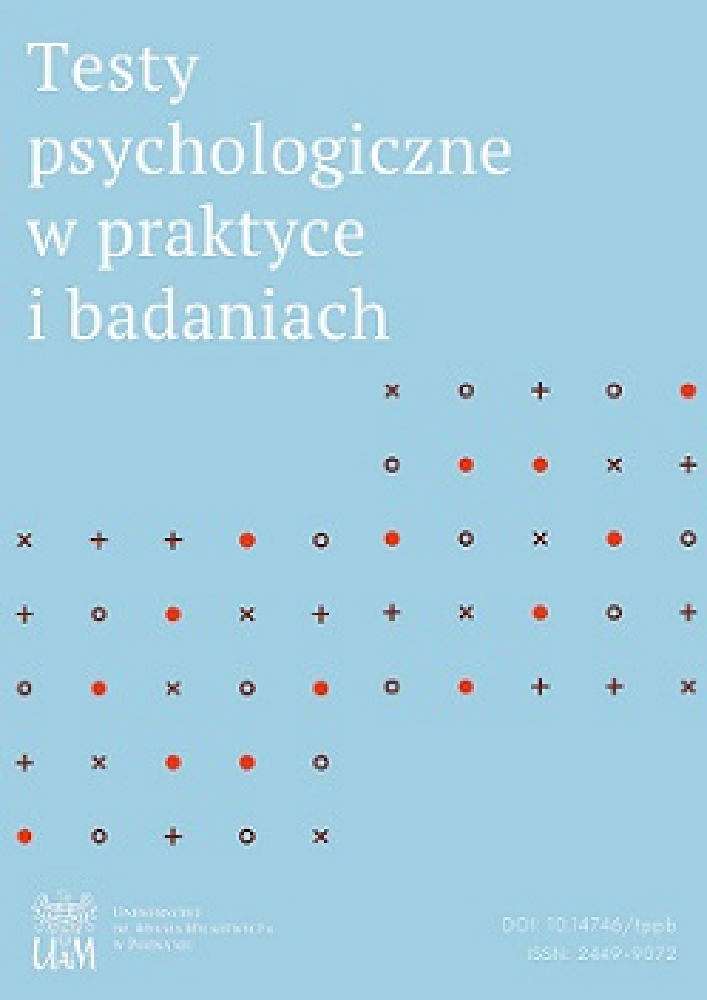Abstrakt
Niniejsza praca poświęcona jest zjawisku prokrastynacji i konstrukcji kwestionariusza badającego zwlekanie. Ze względu na brak polskich badań praca powstała głównie w oparciu o dostępne w internetowych bazach EBSCO artykuły naukowe autorstwa najważniejszych badaczy zajmujących się tą tematyką, m. in. J. R. Ferrariego, C. H. Lay’a, H. C. Schouwenburga, E. D. Rothblum, L. J. Solomon, L. Manna, P. Steela, T. Pychyla. Punktem wyjścia jest przegląd zagadnień teoretycznych, stanowiący wstęp do prezentacji badań własnych. Badania przeprowadzono na próbie 160 ochotników, którzy wypełnili cztery połączone skale – General Procrastination Scale, Adult Inventory of Procrastination, Tuckman Procrastination Scale, Aitken Procrastination Inventory. Na uzyskanych danych dokonano analizy czynnikowej oraz hierarchicznej analizy skupień, wyłaniając 40 pozycji tworzących końcową wersję Kwestionariusza Zwlekania (KZ). Skonstruowana skala zawiera pięć podskal i służy do oceny ogólnego poziomu prokrastynacji oraz pięciu jej aspektów (umiejętność organizacji czasu, siła woli, świadomość prokrastynacji, zwlekanie jako cecha, niepunktualność), a w przyszłości może umożliwiać tworzenie indywidualnych profilów zwlekania osób badanych. Kwestionariusz uzyskał wysoki współczynnik zgodności wewnętrznej alfa Cronbacha 0,971. Analiza sprawdzająca wartość diagnostyczną skali wykazała, że stanowi ona dobre źródło hipotez zarówno badawczych, jak i klinicznych na temat przyczyn i charakterystyki zwlekania osób o różnych poziomach prokrastynacji.
Bibliografia
Beswick, G., Rothblum, E. D., Mann, L. (1988). Psychological Antecedents of Student Procrastination. Australian Psychologist, 23 (2), 207-217.
Díaz-Morales, J. F., Cohen, J. R., Ferrari J. R. (2008). An integrated view of personality styles related to avoidant procrastination. Personality and Individual Differences, 45 (6), 554-558.
Ferrari, J. R. (1992). Psychometric Validation of Two Procrastination Inventories for Adults: Arousal and Avoidance Measures. Journal of Psychopathology and Behavioral Assessment, 14 (2), 97- 10.
Ferrari, J. R., Barnes, K. L., Steel, P. (2009). Life Regrets by Avoidant and Arousal Procrastinators. Why Put Off Today What You Will Regret Tomorrow? Journal of Individual Differences, 30(3), 163-168.
Ferrari, J. R., Johnson, J. L., McCown, W. G. (1995). Procrastination and Task Avoidance. Theory, Research, and Treatment. New York: Plenum Press.
Ferrari, J. R., O’Callaghan, J., Newbegin, J. (2005). Prevalence of Procrastination in the United States, United Kingdom, and Australia: Arousal and Avoidance Delays among Adults. North American Journal of Psychology, 7 (1), 1-6.
Ferrari, J. R., Pychyl, T. A. (2012). “If I Wait, My Partner Will Do It”: The Role of Conscientiousness as a Mediator in the Relation of Academic Procrastination and Perceived Social Loafing. North American Journal of Psychology, 14 (1), 13-24.
Freeman, E. K., Cox-Fuenzalida, L., Stoltenberg, I. (2011). Extraversion and Arousal Procrastination: Waiting for the Kicks. Current Psychology: A Journal for Diverse Psychological Issues, 30(4), 375-382.
Hess, B., Sherman, M. F., Goodman, M. (2000). Eveningness Predicts Academic Procrastination: The Mediating Role of Neuroticism. Journal of Social Behavior and Personality, 15 (5), 61-74.
Hezjod (2011). Prace i dnie. Pobrano z: http://kulturaantyczna.files.wordpress.com/2011/12/hezjodprace-i-dnie.pdf.
Jackson, T., Fritch, A., Nagasaka, T., Pope, L. (2003). Procrastination and Perceptions of Past, Present, and Future. Individual Diferences Research, 1 (1), 17-28.
Kadzikowska-Wrzosek, R. (2010). Wolna wola w świetle badań współczesnej psychologii nad procesami samoregulacji i samokontroli. Psychologia Społeczna, 4 (15), 330-344.
Knaus, W. J. (2007). Nie odkładaj spraw na później. Jak sobie radzić z tą zgubną skłonnością. Przeł. O. Waśkiewicz. Warszawa: Jacek Santorski & Co Agencja Wydawnicza.
Lazarus, R. S., Folkman, S. (1987). Transactional theory and research on emotions and coping. European Journal of Personality, 1 (3), 141-169.
Mann, L., Janis, I. L., Chaplin R. (1969). Effects of Anticipation of Forthcoming Information on Decisional Processes. Journal of Personality and Social Psychology, 11 (1), 10-16.
Milgram, N. A., Sroloff, B., Rosenbaum, M. (1988). The Procrastination of Everyday Life. Journal of Research in Personality, 22 (2), 197-212.
Milgram, N., Marshevsky, S., Sadeh, C. (1995). Correlates of Academic Procrastination: Discomfort, Task Aversiveness, and Task Capability. Journal of Psychology, 129 (2), 145-155.
Milgram, N., Tenne, R. (2000). Personality Correlates of Decisional and Task Avoidant Procrastination. European Journal of Personality, 14 (2), 141-156.
Orellana-Damacela, L. E., Tindale, R. S., Suárez-Balcázar, Y. (2000). Decisional and Behavioral Procrastination: How They Relate to Self-Discrepancies. Journal of Social Behavior and Personality, 15 (5), 225-238.
Paulitzki, J. R. (2010). Procrastination as Self-Regulatory Failure. Habitual Avoidance and Inhibitory Control Moderate the Intention-Behaviour Relation for Unpleasant Tasks (Dysertacja doktorska, University of Waterloo, 2010). Pobrano z: https://uwspace.uwaterloo.ca/bitstream/handle/10012/5374/Paulitzki_Jeff.pdf?sequence=3.
Schouwenburg, H. C. (1992). Procrastinators and fear of failure: an exploration of reasons for procrastination. European Journal of Personality, 6 (3), 225-236.
Solomon, L. J., Rothblum, E. D. (1984). Academic Procrastination: Frequency and CognitiveBehavioral Correlates. Journal of Counseling Psychology, 31 (4), 503-509.
Specter, M. H., Ferrari, J. R. (2000). Time Orientations of Procrastinators: Focusing on the Past, Present, or Future? Journal of Social Behavior and Personality, 15 (5), 197-202.
Steel, P. (2007). The Nature of Procrastination: A Meta-Analytic and Theoretical Review of Quintessential Self-Regulatory Failure. Psychological Bulletin, 133 (1), 65-94.
Steel, P. (2010). Arousal, avoidant and decisional procrastinatinators: Do they exist? Personality and Individual Differences, 48 (8), 926-934.
Strelau, J., Doliński, D. (2008). Psychologia. Podręcznik akademicki. T. 1 i 2. Gdańsk: Gdańskie Wydawnictwo Psychologiczne.
